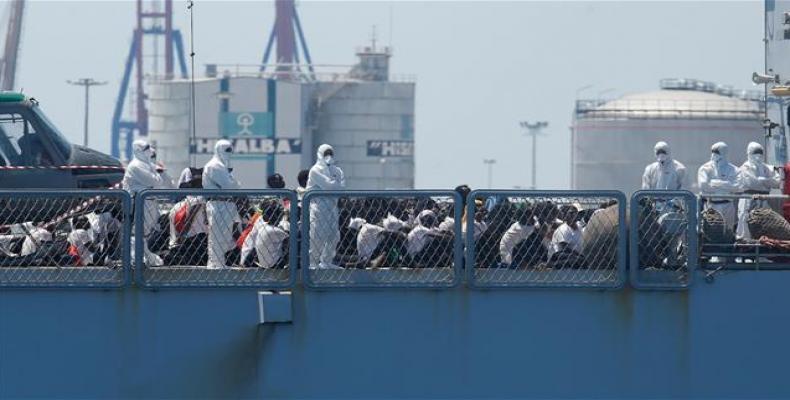Tripoli, June 29 (RHC)-- Italy's right-wing government has called for migrant camps to be set up in Libya under the pretext of stopping asylum-seekers fleeing toward western Europe. “Reception and identification centers should be set up...,” Italy’s anti-immigration interior minister, Matteo Salvini, said on a visit to Libya, the departure point for most migrants trying to reach Europe by sea.
Meeting his counterpart in Libya’s internationally-recognized government Abdulsalam Ashour and Deputy Prime Minister Ahmed Maiteeg, Salvini thanked the Libyan coastguard for its “excellent work” in rescuing and intercepting migrants.
The interceptions have been criticized by human rights activists because of the dire conditions facing migrants in widely lawless Libya, where they often face physical abuse including torture and rape. However, the Tripoli-based government, which does not control the whole of Libya, is unwilling to host reception centers itself. Maiteeg said that while his government was ready to tackle migration, “we completely reject any migrant camps in Libya.”
After returning to Italy, Salvini said such centers should be set up south of Libya, in Niger, Mali, Chad and Sudan. Earlier, he said the EU should fund efforts in Africa to stop uncontrolled migration to Europe.
As EU leaders prepared to discuss immigration policy in Brussels on Thursday and Friday, Italy’s refusal to accept charity-run rescue ships has stranded hundreds of Africans at sea, their rescuers waiting for an EU country to accept them.
Rescue ship Lifeline, with more than 230 migrants aboard, is stuck in international waters in the Mediterranean. And a private cargo ship, the Alexander Maersk, has been waiting to be assigned a port since it picked up 113 migrants off southern Italy on Friday, the ship-owner said.
Earlier this month, a vessel carrying more than 600 migrants on board was stranded after being refused by Italy before it was accepted by Spain.
Italy’s anti-immigration stance, criticized by human rights groups who say its risks lives at sea, has sharpened divisions in the EU. In Italy, Salvini’s actions and rhetoric have been popular with voters, with his right-wing League party gaining ground in municipal elections on Sunday.
Salvini’s opponents accuse him of playing on fear, noting that crossings have fallen sharply since last July after the previous Italian government targeted people-smuggling networks and Libya’s EU-trained coastguard stepped up interceptions.
Italy's right-wing government calls for migrant camps in Africa


